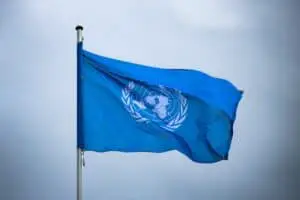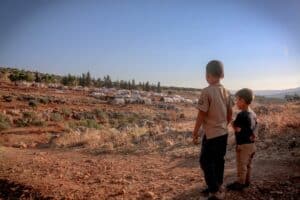Whether you’re looking to launch a career in aid work or are a seasoned humanitarian wanting to read deeper into your work, there are many top books on humanitarian aid. From personal memoirs of humanitarian workers to detailed research into humanitarian affairs, we’ve compiled a comprehensive list of the best books covering a huge range of humanitarian topics.
Chasing Chaos: My Decade in and Out of Humanitarian Aid by Jessica Alexander
Showing the highs and lows of working on the frontline of humanitarian aid, Chasing Chaos by Jessica Alexander describes candidly life as a humanitarian worker. The book details Alexander’s initial idealism towards humanitarian work and her realisation of challenges aid work inherently poses. From her first mission in Rwanda, through Sudan and Haiti, Chasing Chaos shows readers the reality of life and work in humanitarian aid.
An ideal introduction to readers who want an honest and realistic account of working in humanitarian aid, Chasing Chaos is one of the best regarded humanitarian memoirs. The book introduces readers to the difficult, messy and chaotic side of aid work, whilst also showing what can make working in humanitarian aid a truly amazing career. Chasing Chaos combines candid stories of humanitarian life with honest critiques of the aid industry.
Emergency Sex (And Other Desperate Measures): True Stories from a War Zone by Andrew Thomson, Heidi Postlewait and Kenneth Cain
Emergency Sex (and Other Desperate Measures) is perhaps the most notorious book on humanitarian aid work. The book takes readers on intertwined account of three young professionals who join the United Nations. From Cambodia to Rwanda, Bosnia to Serbia, Emergency Sex combines an expose of United Nations bureaucracy and a critique of West’s ineffectual policies to global issues with true life accounts of working on the front-line of humanitarian emergencies.
Famous and infamous in equal measure, Emergency Sex is a must read for those interested in humanitarian work or the United Nations. Brutally honest, the book details how idealism can lead to despair as the authors navigate the complex layers of UN bureaucracy and inefficient leadership. Honest, funny, touching and critical throughout, Emergency Sex caused huge controversy when it was published.
In the Eyes of Others: How People in Crises Perceive Humanitarian Aid by Caroline Abu-Sada
Published by Medecins Sans Frontieres (MSF), In the Eyes of Others investigates how humanitarian aid is viewed by the people who receive it. The book is one of the first major studies into how the people who are the recipients of aid perceive the organisations and aid workers who deliver it. Including extensive research across a wide range of humanitarian contexts, In the Eyes of Others is the leading book on community perceptions of humanitarian aid. Vital reading for all humanitarian workers.
By researching in-depth, and across multiple contexts, Abu-Sada’s book In the Eyes of Others provides readers with a broad perspective of how humanitarian aid is perceived by its recipients. The book draws conclusions that humanitarian NGO’s efforts to communicate with populations may be failing, and that better and more attuned methods need to be used to align aid recipients’ perceptions with those of humanitarian aid NGOs.
Spaces of Aid: How Cars, Compounds and Hotels Shape Humanitarianism by Lisa Smirl
Exploring the juxtaposition between humanitarian ideals and the current methods of aid delivery, Lisa Smirl’s book Spaces of Aid explores the impact of physical infrastructure on the aid industry. Smirl’s book investigates the common logistical set-up of aid responses – land cruisers, guarded compounds, computer-based working, and explores the fascinating origins of how those who work to help people affected by disasters and conflicts can often be so separated from them.
Exploring a commonly neglected aspect of aid work, Smirl’s book brings together a wide range of research into the impact of aid workers physical separation from their beneficiaries. Readers also explore how this separation impacts the effectiveness of humanitarian aid and the perception of beneficiaries, as well as exploration how aid workers can be pulled from their confines and reconnected with those they are trying to serve.
Band-Aid for a Broken Leg: Being a Doctor with No Borders (and Other Ways to Stay Single) by Damien Brown
A first-hand account of working for Médecins San Froniteres (MSF) across Africa, Damien Brown’s Band-Aid for a Broken Leg is a must read for those interested in medical humanitarian work. From Brown’s first mission in a remote outpost in war-torn Angola to humanitarian medical missions in Mozambique and South Sudan, the book explores the reality of humanitarian work in remote locations and the touching, and sometimes humours, stories that occur.
Band-Aid for a Broken Leg is one of the best books written on working on the frontline of humanitarian aid. Exploring in detail the working life, conditions and colleagues; Brown’s book is an honest account of life in humanitarian aid. The book combines moving testimonies of humanitarian needs whilst highlighting, often with humour, the absurdities than can occur in humanitarian life. The book also explores the real impact humanitarian work can have on some of the communities most in need.
The Paradoxes of Aid Work: Passionate Professionals by Silke Roth
Silke Roth’s The Paradoxes of Aid Work investigates what makes people undertake humanitarian work. The book explores the sometimes-complex world of ‘aidland’, covering the many forms of employment and organisations that make up the modern humanitarian aid industry. Roth’s book reveals in-depth key aspects of aid work, including the living conditions, gender balances and inequality that can occur within the humanitarian sector. The Paradoxes of Aid Work is a revealing read for those interested in the inner-workings of the humanitarian aid sector.
The Paradoxes of Aid Work takes the readers on a journey through the connections between contemporary development work, humanitarian aid and human rights works. Extensive data is used to explain to the reader the sometimes-contradictory experiences of those working within humanitarian aid. The Paradoxes of Aid Work is one of the leading books exploring how the humanitarian aid sector is navigated and what impact working in aid has on the life of humanitarian workers.
Managing Humanitarian Relief: An Operational Guide for NGOs by Eric James
Aimed at those working in humanitarian aid, Eric James’ book Managing Humanitarian Relief is a practical guide for aid workers. The book covers how aid programmes can be established to assist people affected by extreme crises, whilst also providing the reader a breakdown of the events they are likely to encounter in the field. Designed as a general guide for aid workers, Managing Humanitarian Relief aims to be a catch-all book for humanitarian managers and an indispensable resource on aid work.
Managing Humanitarian Relief clearly explains topics with details of how each aspect of aid work can be implemented. Allowing readers to reference areas quickly, the book contains supporting checklists, tables, diagrams and sample forms providing practical tools for humanitarian workers in the field. The book also contains tips and advice from seasoned aid workers alongside providing a comprehensive guide to implementing humanitarian projects.
Inside the Everyday Lives of Development Workers: The Challenges and Futures of Aidland by Heather Hindman
Heather Hindman’s Inside the Everyday Lives of Development Workers is another book focusing on humanitarian workers and exploring what drives people to work in aid and the impact it has on them. Readers are taken behind the front-facing network of NGO’s, donor and government agencies that comprise the aid industry to look at the individuals who make up these organisations. Hindman’s book also explores the sometimes unique cultural and social world that has arisen within the humanitarian aid sector.
Inside the Everyday Lives of Development Workers is one the leading books shining a light on motivations, potential conflicts and moral beliefs of people who work in humanitarian aid. Hindman connects the initial passions that drives aid workers with the reality of humanitarian work, questioning the link between aid workers and the beneficiaries of humanitarian projects. A highly recommended book for those wanting an in-depth study of working in humanitarian aid.
Doing Bad by Doing Good: Why Humanitarian Action Fails by Christopher J. Coyne
Christopher J. Coyne’s book Doing Bad by Doing Good is a wide-ranging critique of the humanitarian aid sector and its impact. Focusing on the 2010 Haiti earthquake and the humanitarian response that followed, Coyne’s book uncovers the bureaucratic mistakes that resulted in aid resources failing to reach those in need. Readers are then introduced to the economic realities that can mean Haiti and other humanitarian responses can actually do more harm than good.
Doing Bad by Doing Good explores how decades of humanitarian interventions have failed to achieve lasting impact. Coyne’s book contains in-depth research into the reasons humanitarian actions can fail, alongside the significant examples and case-studies. A potentially difficult read for the humanitarian sector, Doing Bad by Doing Good provides a deep rationale for reform within the humanitarian aid sector and provides alternative models for delivering humanitarian aid more effectively.
Humanitarian Ethics: A Guide to the Morality of Aid in War and Disaster by Hugo Slim
Humanitarian Ethics by Hugo Slim is one of the core books exploring the ethical implications of humanitarian work. As humanitarians are faced with continuous practical and moral questions within their work, Hugo Slim’s book attempts to investigate how aid workers can better address these ethical challenges. Exploring key questions such as whether humanitarian responses cover for international crimes and if working with armed groups to assist in aid delivery can be justified, Humanitarian Ethics is one of the leading books on the subject of ethics in aid work.
One of the top books on morality and ethics within humanitarian work, Hugo Slim’s Humanitarian Ethics contrasts the ideals humanitarians aspire to with the often-complex nature of implementing aid projects. Readers are taken through contemporary scenarios in aid response that question how humanitarian aid can be influenced by the context in which it is delivered. The book questions how humanitarian work can remain ethical if the practical implications of assisting those in need compromise its moral foundations.
Governing Disasters: Engaging Local Populations in Humanitarian Relief by Shahla F Ali
Shahla F Ali’s Governing Disasters investigates how humanitarian actors are increasingly needing to engage fully with the population they are serving. The book examines the links between humanitarian agencies, local governments, the private sector and community actors in deciding how humanitarian action is taken. Readers explore the dynamics between these sometimes-competing stakeholders and learn how better engagement with local populations can have a measured positive effect on aid delivery.
Governing Disasters is one of the leading books on local participation in humanitarian work. Readers covers how communities affected by disasters should be engaged during the crises and throughout the recovery phase. Ali’s book draws on a wide range of case studies on global, state and private sector studies to provide readers one of the most complete analysis of local populations engagement in humanitarian action.
Digital Humanitarians: How Big Data Is Changing the Face of Humanitarian Response by Patrick Meier
Patrick Meier’s book Digital Humanitarians takes readers on a journey into a new world of big data within humanitarian action. From social media to satellite imagery, Digital Humanitarians explores how technology is being used to improve humanitarian responses. The book contains numerous case studies on how aid organisations are turning to data and technology and what areas of humanitarian work can be altered by the incorporation of digital technology.
Digital Humanitarians by Patrick Meier covers the rise in a new form of humanitarianism. As crises continue to unfold, technological solutions are now playing a larger role in humanitarian response. The book covers how aid agencies and governments are beginning to see how big data and online interconnectivity can play a major role in humanitarian aid. Digital Humanitarians is mandatory reading for anyone who feels big data and cutting-edge technology has a role to play in improving our world and helping those affected by humanitarian crises.
Humanitarian Logistics: Meeting the Challenge of Preparing for and Responding to Disasters by Peter Tatham and Martin Christopher
The leading textbook on humanitarian logistics, this book covers a wide range of foundational theories and cutting-edge developments in the field of humanitarian supply chain and logistics management. Readers are introduced to effective tools and practices of logistics within humanitarian aid and disaster response. Readers also covers guidance and critiques of the core challenges facing humanitarian supply chains and logistics. This book is mandatory reading for those working, or wanting to work, in humanitarian logistics.
Over a wide range of topics, Peter Tatham and Martin Christopher’s book humanitarian logistics aims to provide readers an up-to-date and comprehensive coverage of the challenges facing humanitarian supply chains and logistics. Combining academic research and anecdotal reports from humanitarian logisticians in the field, the book is ideal for seasoned humanitarian aid workers and those looking to join the aid sector in logistics or supply chain roles.
The Crisis Caravan: What’s Wrong with Humanitarian Aid? by Linda Polman
Linda Polman’s book The Crises Caravan aims to expose the current humanitarian aid industry and question how humanitarian aid can be co-opted by forces acting out injustice. Colman’s book explores powerful examples of times aid worker have become unwitting assistants to atrocities in the name of helping people in need. Written with journalistic flair, The Crises Caravan challenges readers to question the current state of the international humanitarian system.
The Crises Caravan by Linda Polman raises significant questions about how humanitarian aid is currently delivered. Covering humanitarian responses in Afghanistan, Bosnia, Congo, Iraq, Kosovo, Somalia and Sudan, Colman’s book questions the foundational aspects of the humanitarian aid industry, from fundraising and donors to the actions of aid workers and negotiations with armed groups. Readers should expect a strong critique of the humanitarian aid industry.
Becoming an International Humanitarian Aid Worker by Chen Reis
Becoming an International Aid Worker is an introduction book to launching a career in humanitarian aid. The book draws on the inside knowledge of people currently working in the aid industry as well as recruiters at some of the largest humanitarian organisations. The book also contains an analysis of the humanitarian job market over a 9-month period providing readers with a breakdown of the kind of aid jobs on offer. Becoming an International Aid Worker is a must read for those looking to enter the humanitarian sector.
Chen Reis’s book, Becoming an International Humanitarian Aid Worker, asks readers to question whether a career in aid is right for them, before taking them through a step-by-step guide to entering the aid industry. Providing readers with practical guidance and relevant advice, Becoming an International Humanitarian Aid Worker aims to give readers proven strategies for finding their role within the humanitarian sector and going on develop their career in international aid.
Safety First: A Safety and Security Handbook for Aid Workers by Shaun Bickley
Published by Save the Children, one of the largest humanitarian NGO, Safety First is a practical guide on safety and security for aid workers. Humanitarian workers in the field face a multitude of hazards, from robberies and terror attacks, to road accidents and injuries. Safety First provides a practical handbook for aid workers giving readers clear instructions on how to navigate threats and dangers present in the humanitarian field.
Shaun Bickley’s book Safety First is one of the leading texts on humanitarian safety and security. Readers are not only provided detailed guidance on high-risk and life-threatening events, but also on handling stress and ill health that can occur whilst working in humanitarian aid. Bickley’s book aims to highlight the array of risks humanitarian workers face whilst giving readers detailed breakdowns of mitigations and actions to be taken in the event of a safety and security incident.
Humanitarian Action and Ethics by Ayesha Ahmad and James Smith
Humanitarian Action and Ethics by Ayesha Ahmad and James Smith is one of the leading texts on ethics in humanitarian aid. Readers are given an investigation into the moral and ethical challenges humanitarians face alongside an exploration into the contexts of these dilemmas. The book includes case studies from Haiti, South Sudan, Syria and Iraq, rooting the texts in real-world scenarios and providing the reader with a full consideration of how the humanitarian sector has approached its ethical responsibilities.
Ahmad and Smith’s book Humanitarian Action and Ethics explains the inherent moral and ethical issues within humanitarian aid work. The book also provides practical guidance for aid workers to address the ethical challenges arising in their work and tools for meeting the moral dilemmas humanitarianism can pose. Humanitarian Action and Ethics is a crucial text questioning the ethical foundations and core moral beliefs of the humanitarian aid sector.
Humanitarian Negotiations Revealed: The MSF Experience by Claire Magone, Michael Neuman and Fabrice Weissman
Humanitarian Negotiations Revealed takes readers through the often-difficult relationships between humanitarian NGO’s and other actors in humanitarian crises. The book covers the history of MSF, reviewing key moments where negotiations with governments and non-state groups have impacted their humanitarian work. Humanitarian Negotiations Revealed tracks the evolution of humanitarian objectives as well as the resistance that can grow from governments and non-state groups as humanitarians expand their goals.
The book aims in-part to reveal the techniques, successes and failures in humanitarian negotiations whilst allowing readers to question the ongoing narrative around humanitarian access. The book is made up of contributions from a range of humanitarian professionals allowing for a wide scope of perspectives on how humanitarian principles are be met, or compromised, within the field. The book also aims to contrast the new age of humanitarianism, where humanitarian workers are increasingly under-threat, with previous generations and the ‘golden era’ of neutral humanitarianism.
An Imperfect Offering: Humanitarian Action in the Twenty-First Century by James Orbinski
An Imperfect Officer by James Orbinski chronicles his humanitarian career from a recently graduated medical student in working Rwanda through medical missions in Peru, Afghanistan and Somalia. The book is part personal autobiography, part political offering. Orbinksi explores the nature of humanitarian work over the last twenty-years, explaining the imperative humans have to assist those in need. The book takes readers to some of hardest humanitarian responses and sheds light on the immense acts of courage and empathy there.
James Orbinski’s book An Imperfect Offering is a personal account of a decade of humanitarian service. An ideal read for those interested in working in humanitarian aid, the book combines an exploration of the deeply personal lives of people affected by humanitarian crises, and those who work to help them, with a contextual history of how humanitarian crises can occur. Orbinski’s book is deeply scathing of political systems that fail and the brutality that often follows.
The Practical Guide to Humanitarian Law by Françoise Bouchet-Saulnier
The Practical Guide to Humanitarian Law is an introductory book on the principle of international humanitarian law and its’ practical implications. First published in 1998 and frequently updated and translated, The Practical Guide to Humanitarian Law is written from the view-point of victims, combined with inputs from those who work to help them. The book also covers how international humanitarian law has evolved and the major challenges it faces.
Bouchet-Saulner’s book is a reader-friendly guide to humanitarian law. The book is ideal for those studying international humanitarian law, human rights or humanitarian action. It covers the major rules of humanitarian law and how protection to victims of conflicts and crises should be managed, as well as discussions on how international criminal justice can be brought. The Practical Guide to Humanitarian Law is one of the leading texts of its kind and is perfect for those wanting to analyse and understand the legal implications of world events.
International Humanitarian NGOs and State Relations: Politics, Principles and Identity by Andrew J. Cunningham
Andrew J. Cunningham’s book International Humanitarian NGOs And State Relations examines the often-troubled relationship between humanitarian actors and governments. Humanitarian NGOs work within sensitive political arenas when responding to man-made disasters and conflicts. This book covers how local political dynamics can affect humanitarian action and questions NGO’s abilities to remain truly neutral in such contexts.
With detailed case studies throughout the book, International Humanitarian NGOs and State Relations roots its research in real world humanitarian responses. Critical ideas of how NGO can best liaise with state actors, the issues that can arise and how NGO can be navigate relationships with governments are explored in full. The book is also practice-based, giving current humanitarian workers tools, methods, principles and structures with which to improve their negotiations with non-state and government actors in the field.
Humanitarian Crises and Migration: Causes, Consequences and Responses by Susan F. Martin
As migrations and refugee crises becoming increasingly common, humanitarian actors must, more than ever, respond to large-scale displacements. Susan F. Martin’s book Humanitarian Crises and Migration covers both the practical responses humanitarian NGOs must mount to displacement crises as well as an analytical investigate of current refugee and migration policy. The book aims to address the real challenges facing refugees and migrants and the acts to speak out on the status quo of the current humanitarian response to mass-displacements.
Martin’s book brings together leading experts in the field of migrations, refugees and humanitarian action to explore the background to the current waves of mass-displacement. Readers reflect on some of the major questions of modern migrations, with case studies included on Mexico, Somalia, Libya, Pakistan and Colombia. The book critiques the legal processes in-place to deal with refugees and migrants as well as investigating how humanitarian actors can better respond, including to migrants at sea, those displaced in urban settings and displaced persons unable to move.
World’s Emergency Room: The Growing Threat to Doctors, Nurses, and Humanitarian Workers by Michael VanRooyen
Chronically the increased dangers faced by humanitarian workers, Michael VanRooyen’s book World’s Emergency Room is a stark reminder of the risks aid workers face in the field. The book charts the worrying trend of increased violent attacks against humanitarian workers whilst looking at the root causes on these increased risks. VanRooyan provides readers experiences from his personal time working in humanitarian aid, combined with expert research into the mounting dangers humanitarian’s face.
The World’s Emergency Room focuses on the world of medical humanitarian relief, taking readers into the clinics, wards, hospitals and field-stations across the world where front-line humanitarian medical work is undertaken. Detailing the often-dangerous conditions as well as the scarifies that can be made to bring medical relief to those in need, VanRooyan’s book is a must read for those interested in medical humanitarian aid or investigating the increased threats aid workers face.





